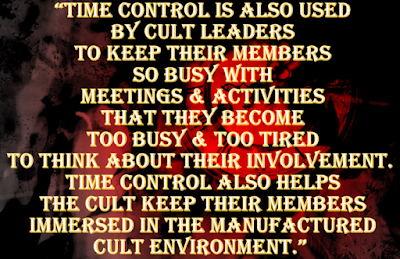A comment from the
Dave Pack's Land Grab posting:
All of the things mentioned above are classic cult indoctrination and manipulation tools in order to wear people down and to instill fear in them.
Loaded language
The jargon in cults has multiple effects.
- The group members feel understood because they all use the same words and it generates a sense of camaraderie (and elitism - see below).
- New people may feel left out and often want to learn what the words and phrases mean, drawing them deeper into the mindset of the cult.
- Complex situations are often reduced to a few words, and this begins to shut down the critical thinking of the members.
- The words and phrases can dictate how the members should act in certain situations without having to make decisions. For example, one group had a phrase that meant that seniors in the hierarchy of the group were always right. So if there were any problems or disagreements, the phrase sorted everything out!
- When the jargon is second nature, talking to outsiders may become tedious and awkward and this keeps group members isolated from outside influences.
Elitist mentality
As part of cult tactics, members are made to feel special. They are part of an elite group that is going to, for example, change history, save the world, change humankind in some way or be saved by god. They have a strong sense of mission or purpose which binds them together and keeps them working hard and giving of themselves - in other words, slaving and sacrificing!
This sense of elitism makes them feel more important or superior to those outside the group, especially to people in other cults, which they can easily spot!
This gives rise to one of the many
contradictions in cults. While members are obedient and humble before the leadership, they can be arrogant to outsiders.
This elitism also brings responsibility, because they feel more responsible for saving the world. And of course, this sense of responsibility can be used by the leaders to manipulate them even further, inducing guilt if they don't properly perform their duties, earn enough money, recruit enough people, and so on.
The end justifies the means
Because they are doing very important things like god's work, or saving the earth, rescuing mankind, or simply doing 'The Work, members are led to believe that lying, cheating, and deceiving outsiders for money or getting them to come along to the group is justified.
And remember that many group leaders are psychopaths. This means they have no empathy, guilt or remorse. Ever!
Add to this their inflated sense of self worth, grandiosity and sense of entitlement, and they believe they can do whatever they like, take what they want, abuse whoever they please etc. etc. without any consideration for others. For them the end always justifies the means.
And then consider that the leader is creating clones of himself...!!!
Group dominates individual
In destructive groups, the group comes first. Loyalty and obedience to the leadership are very highly regarded parts of the cult psychology.
Members learn with to distrust themselves and trust the authoritative leader, looking to him or her for direction and meaning in their lives. They put aside their own wants and needs in favor of those of the group. To a large extent, cult control causes their own well-being to become enmeshed with the well-being of the leader.
Sense of community
When a new member first joins a
destructive group, there is a very strong sense of community, unconditional love, joy, happiness etc. Later, when the member is indoctrinated, he or she learns that this sense of belonging very much
depends on good behavior.
If they break the rules, criticize the leadership, express negative emotions such as anger or distrust of the leader, they quickly find themselves ostracized by the group until they sort out the 'problem' (any problem is usually the fault or responsibility of the member, not the leader!)
It's another
contradiction in groups that while
everybody is encouraged to be equal and the same, competition is used to shame members who are not working hard enough, and to spur the hard work workers on even more.
The members feel quite close to each other, in fact, they may feel closer to people in this group than to anyone ever before in their lives. However, closer examination shows that the relationships are quite shallow (they tell on each other; they can be hyper-critical of mistakes; members may know little or nothing about each other's pasts, families or friends; there is often little or no consideration for the problems or needs of others, unless there is a benefit in it for themselves; and when members leave a group, it is often as if the remaining members simply forget about them; and in reality all they know is the pseudopersonality, they have little real contact with the real identity!)
Besides, true friendships are discouraged because the leader wants all the adoration and attention for himself.
On top of this, if one person leaves he may bring his friends with him. Of course, if someone does leave, the anger, frustration, disgust and hatred are directed towards them. (In these situations, anger and hatred are encouraged, of course!) A supposedly close bond between ' friends' can change in an instant if one person becomes a nonbeliever or a traitor!
Understanding Cult Psychology


